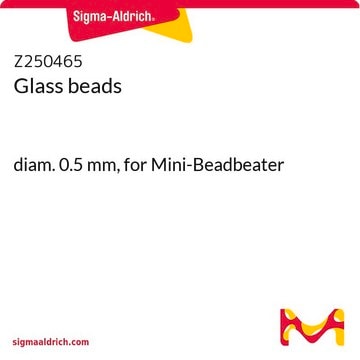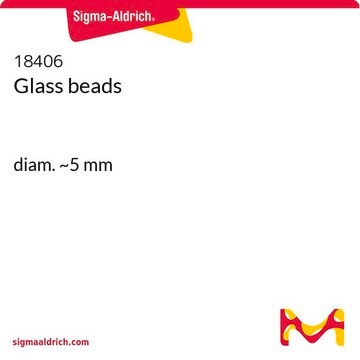G9268
Glass beads, unwashed
425-600 μm (30-40 U.S. sieve)
Synonym(e):
Glass beads
Anmeldenzur Ansicht organisationsspezifischer und vertraglich vereinbarter Preise
Alle Fotos(4)
About This Item
UNSPSC-Code:
41100000
NACRES:
NB.22
Empfohlene Produkte
Partikelgröße
425-600 μm (30-40 U.S. sieve)
Anwendung
Unwashedglass beads have been used:
- in the quantification of protein in fungal colonybiofilm
- in the lysis of microglial cells for the extraction andquantification of chlorophylls and cell mortality rate
- in the extraction ofDNA and RNA from microbial communities
Lagerklassenschlüssel
11 - Combustible Solids
WGK
WGK 3
Flammpunkt (°F)
Not applicable
Flammpunkt (°C)
Not applicable
Persönliche Schutzausrüstung
Eyeshields, Gloves, type N95 (US)
Analysenzertifikate (COA)
Suchen Sie nach Analysenzertifikate (COA), indem Sie die Lot-/Chargennummer des Produkts eingeben. Lot- und Chargennummern sind auf dem Produktetikett hinter den Wörtern ‘Lot’ oder ‘Batch’ (Lot oder Charge) zu finden.
Besitzen Sie dieses Produkt bereits?
In der Dokumentenbibliothek finden Sie die Dokumentation zu den Produkten, die Sie kürzlich erworben haben.
Kunden haben sich ebenfalls angesehen
Ruoyun Li et al.
Journal of proteomics, 203, 103377-103377 (2019-05-19)
The molecular mechanism of Saccharomyces cerevisiae tolerant to ethanol stress remains to be further elucidated. In this study, a comprehensive analysis based on RNA-seq and iTRAQ LC-MS/MS was used to investigate the global mechanism of S. cerevisiae strain Sc131 in
Production of long chain omega-3 fatty acids and carotenoids in tropical areas by a new heat-tolerant microalga Tetraselmis sp. DS3
Hsin P T, et al.
Food Chemistry, 682-690 (2016)
Daniel R Leadbeater et al.
Microbiome, 9(1), 48-48 (2021-02-19)
Salt marshes are major natural repositories of sequestered organic carbon with high burial rates of organic matter, produced by highly productive native flora. Accumulated carbon predominantly exists as lignocellulose which is metabolised by communities of functionally diverse microbes. However, the
Zinc oxide nanoparticles hinder fungal biofilm development in an ancient Egyptian tomb
Gambino M, et al.
International Biodeterioration & Biodegradation, 122, 92-99 (2017)
Xavier Garcia-Ortega et al.
Frontiers in bioengineering and biotechnology, 3, 107-107 (2015-08-19)
The most commonly used cell disruption procedures may present lack of reproducibility, which introduces significant errors in the quantification of intracellular components. In this work, an approach consisting in the definition of an overall key performance indicator (KPI) was implemented
Unser Team von Wissenschaftlern verfügt über Erfahrung in allen Forschungsbereichen einschließlich Life Science, Materialwissenschaften, chemischer Synthese, Chromatographie, Analytik und vielen mehr..
Setzen Sie sich mit dem technischen Dienst in Verbindung.











